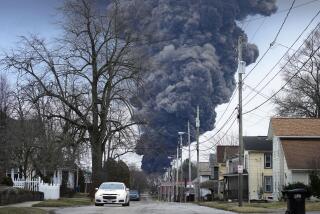India Accuses Carbide of Homicide in Bhopal Deaths
- Share via
NEW YORK — The government of India filed criminal charges, including “culpable homicide,” Tuesday against Union Carbide Corp., nine employees and two of its foreign affiliate firms for the 1984 gas leak in Bhopal, India, that killed 2,800 people.
Besides the homicide count, the government charged the companies and employees with causing injuries and with lesser related crimes in connection with the leak, which injured tens of thousands of people and was the world’s worst industrial accident. The charges against the employees--including former Union Carbide Chairman Warren M. Anderson--could, upon conviction, lead to penalties ranging from 3 1/2 years to life in prison.
The charges were filed in Bhopal at a time when public opinion in India has been aroused by an anticipated civil settlement with Union Carbide that many Indians consider unfair to the victims. In recent months, the chemical company’s lawyers have been negotiating with Indian government lawyers over settlement plans that would divide $500 million to $600 million among the accident victims.
The government had sought $3.3 billion in compensation from Union Carbide.
Although the settlement talks broke down last month, reports about the possibility of an agreement have ignited demonstrations in the central Indian city of Bhopal that have worried civil authorities and leaders of India’s ruling Congress-I Party.
One source close to the case speculated that the filing of criminal charges might be a tactic to make Union Carbide more willing to agree to a generous settlement. The Indian government might be willing to drop or reduce the criminal charges if the civil case went its way, the source speculated.
At company headquarters in Danbury, Conn., Union Carbide officials brushed off the charges as a political move and repeated their contention that the leak of methyl isocyanate on the night of Dec. 3, 1984, was the result of sabotage by a yet-unidentified, disgruntled employee.
Calling the accusations “completely unfounded,” spokesman Robert M. Berzok said the charges “appear to be motivated by the government of India’s political inability to accept the fact of employee sabotage.” He said the government appears to be using the charges as a means of deflecting public criticism on the third anniversary of the accident.
Berzok said Union Carbide does not expect that India will ask for the extradition of Anderson or that the U.S. government would comply with the request if it were sought. Anderson retired from Union Carbide in November, 1986, and lives in Greenwich, Conn., a suburb of New York City.
The other employees who were charged are Indian nationals and are present or former employees of Union Carbide Ltd. of India, which is 50.9% owned by Union Carbide Corp. Among them are Keshub Mahindra, retired chairman of Union Carbide Ltd. of India; V.P. Gokhale, the current managing director and chairman; Kishore Kamdaar, a vice president; and J. Mukund, the plant manager.
The crimes with which the two affiliated firms--Union Carbide Ltd. of India, and Union Carbide Eastern Inc. of Hong Kong--were charged are punishable by fines.
The possibility of criminal charges has hung over Union Carbide since the accident. Anderson was arrested by Indian authorities when he visited Bhopal in December, 1984, but was released, Indian officials said, for fear that his presence might arouse some Indians to violence.
Union Carbide officials said Anderson had no comment.
With its thousands of potential claimants, the civil case is monumentally complex and may establish important precedents in the liability of multinational corporations. Environmentalists and political activists have contended that Union Carbide as well as other multinationals must be held accountable for any harmful actions in developing nations.
As the presiding judge in the case recently reminded the lawyers for both sides, many of the disaster’s impoverished victims continue to suffer without medical treatment while the case is argued.
The civil case was sent to Indian courts last September when the U.S. Supreme Court declined to review an appeals court finding that the matter should be handled in the Indian judicial system.
Union Carbide has not publicly released the name of the former employee who company officials say caused the leak, but the company contended Tuesday that his identity would become known if the criminal or civil cases were to come to trial.
Michael Ciresi, the Minneapolis attorney who represented the Indian government while the civil case was in American courts, said he expects the criminal charges to have “no effect” on the civil litigation.
A number of securities analysts interviewed said that while the criminal charges may be a further blot on the company’s public image, they probably would not be seen by investors as likely to have an adverse effect on the corporation’s earnings.
More to Read
Sign up for Essential California
The most important California stories and recommendations in your inbox every morning.
You may occasionally receive promotional content from the Los Angeles Times.











